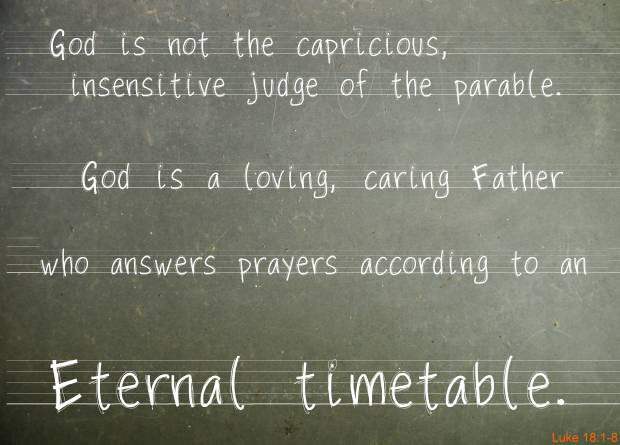 START WITH SCRIPTURE:
START WITH SCRIPTURE:
Matthew 21:33-46
CLICK HERE TO READ SCRIPTURE ON BIBLEGATEWAY.COM
OBSERVE:
Jesus continues to confront his adversaries, using a parable as his medium. Previously, he had confounded their challenge to his authority through key questions; he had also pointed out their unrepentant pride with a parable about two sons (Matthew 21:23-32).
Now Jesus tells a parable with a familiar setting — a vineyard. The vineyard and the vine were familiar Old Testament symbols, signifying the nation of Israel (cf. Isaiah 5:1-7; 27:2-3; Jeremiah 2:21; 12:10; Ezekiel 17). Telling such a story, featuring a familiar image for Israel, would certainly arrest the attention of the chief priests and Pharisees. Surely they understand that he is talking about Israel, and specifically about them.
In short, here is the outline of the parable — the landlord has planted a vineyard, complete with wine press and tower. He leases this vineyard out to tenant farmers — basically, they are sharecroppers. When the landlord sends his own employees to collect his share of the yield, his servants are beaten, killed and stoned to death. When he sends his own son, assuming the tenants will treat him with honor, they plot his death. Their logic is that once the heir is dead, they will get his inheritance.
After telling this parable, Jesus returns to his interrogative method — he asks the question:
When therefore the lord of the vineyard comes, what will he do to those farmers?
Somehow, the Pharisees and priests have gotten involved in the story. They seem oblivious to the point Jesus is making, and describe in colorful terms what will happen:
They told him, “He will miserably destroy those miserable men, and will lease out the vineyard to other farmers, who will give him the fruit in its season.”
Once again, Jesus springs the trap, using the very Scriptures that these men should know, from Psalm 118:22-23:
Jesus said to them, “Did you never read in the Scriptures,
‘The stone which the builders rejected,
the same was made the head of the corner.
This was from the Lord.
It is marvelous in our eyes?'”
This metaphor was another fairly familiar Old Testament image (cf Isaiah 28:16). The cornerstone of a building is considered foundational — it unites two intersecting walls. Jesus picks up this image from the Psalm and applies it to himself as the Messiah — saying that those who reject him will find themselves crushed by that stone. This image of the cornerstone will be repeated by other New Testament writers, signifying that Jesus is foundational to salvation and the church, and that one’s response to him will determine one’s destiny (Ephesians 2:19-22; 1 Peter 2:5-7).
Jesus now makes it quite clear — without parables, questions, dialectical method — exactly what he means:
Therefore I tell you, God’s Kingdom will be taken away from you, and will be given to a nation producing its fruit. He who falls on this stone will be broken to pieces, but on whomever it will fall, it will scatter him as dust.
The point is taken — the tenants of the vineyard represent the chief priests and the Pharisees, and also all their predecessors who rejected the prophets who came on behalf of God. Now, Jesus is prophesying his own death represented by the son of the landlord. But he is also warning the leaders that the tables will be turned — the son who is killed is also the cornerstone. And when they reject him, they will be crushed. God will raise up a new nation which produces fruit — this new nation will be the church.
This time the adversarial leaders get it. They realize Jesus is accusing them of rejecting both the prophets, and the Son himself:
When the chief priests and the Pharisees heard his parables, they perceived that he spoke about them.
But they are stymied. Just as Jesus had paralyzed them earlier by asking where the authority of the popular John the Baptist came from, now the leaders are aware that they are powerless:
When they sought to seize him, they feared the multitudes, because they considered him to be a prophet.
His arrest and the execution will come, as Jesus knows. But he uses his popularity with the people as a screen. He will choose the time and place that he is to offer up his life as a sacrifice.
APPLY:
Our study of the Bible includes the Old Testament for a very good reason — it is impossible to fully understand and appreciate the New Covenant introduced by Jesus without understanding that he fulfills the promises and hopes of Israel.
The images in this passage — the vineyard, the cornerstone, the allusion to Psalm 118 — all remind us that the story of the New Testament is continuous with the Old Testament.
And we must be careful not to read any anti-Semitism into this passage. The chief priests and Pharisees do fail to recognize Jesus as the Messiah, in fulfillment of the prophecies. But the first believers, the early church, and Jesus himself were Jews.
What they do see is that the promises of God, the Messiah, salvation, and the church, were to be for all people — Jews and Gentiles alike. Paul interprets this very well in a passage that deserves to be quoted in full:
Therefore remember that once you, the Gentiles in the flesh, who are called “uncircumcision” by that which is called “circumcision”, (in the flesh, made by hands); that you were at that time separate from Christ, alienated from the commonwealth of Israel, and strangers from the covenants of the promise, having no hope and without God in the world. But now in Christ Jesus you who once were far off are made near in the blood of Christ. For he is our peace, who made both one, and broke down the middle wall of partition, having abolished in the flesh the hostility, the law of commandments contained in ordinances, that he might create in himself one new man of the two, making peace; and might reconcile them both in one body to God through the cross, having killed the hostility thereby. He came and preached peace to you who were far off and to those who were near. For through him we both have our access in one Spirit to the Father. So then you are no longer strangers and foreigners, but you are fellow citizens with the saints, and of the household of God, being built on the foundation of the apostles and prophets, Christ Jesus himself being the chief cornerstone; in whom the whole building, fitted together, grows into a holy temple in the Lord; in whom you also are built together for a habitation of God in the Spirit (Ephesians 2:11-22).
This passage not only reminds us that Christ is our chief cornerstone, but that all who believe are now incorporated into the household of God, both Jews and Gentiles now made one in Christ.
RESPOND:
The tension is building as Jesus draws closer and closer to the end. His parables and his questions are surgical. Jesus exposes the hostility of his adversaries, which becomes more and more apparent.
But Jesus also makes it clear to us just who he is, and what we should believe. He is the Son, who is rejected by the tenants and killed. And he is the cornerstone of our faith and our church — and those who reject him reject him at their peril. But to those who believe — what he has done is marvelous in our eyes.
Lord, you are the cornerstone of my faith. May I build my life on your foundation. Amen.
PHOTOS: "Cornerstone" by Brett Jordan is licensed under a Creative Commons Attribution 2.0 Generic license.








